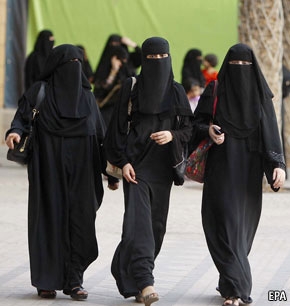Saudi Women to Vote for the First Time
One of most repressed society for women

NEW DELHI: Women in Saudi Arabia will be able to run for the local municipal elections due in December and vote in them for the first time in the Kingdom’s history. The development came as a result of what late King Abdullah bin Abdul-Aziz Al-Saud had announced in 2011, that women will be allowed to participate in the local elections in 2015 and also become part of the Shura Council, an advisory body to the King.
So far 70 women have registered as candidates, while 80 have applied as campaign managers. The decision is being seen as a progressive step coming on the heels of a big turnaround in the political climate of the region following the Arab-spring.
Fawzia Abu Khalid, a political scientist at King Saud University said to Al-Jazeera that, “I think there is the realization from different groups, including the conservative groups, that what happened in the past, where their voice was the only representative in society, would no longer continue.”
At the moment there’s no woman in the cabinet in the Kingdom, though there was one Norah al-Faiz who was the deputy education minister in the national government, but she was replaced in a shuffling of the cabinet earlier this year by present King Salman. However, in Shura Council 30 women were selected to advise King on relevant matters in 2013, post King Abdullah’s decree. King Abdullah University for Science and Technology (KAUST), the first co-ed university in the country, was also established following the King’s decision to opening avenues to women.
The decision to allow women to vote and run, however progressive, still doesn’t impress many. Rothna Beghum, a Middle East right’s researcher working for Human Rights Watch, said to Al-Jazeera, “If [the election] does take place, Saudi Arabian women will, for the first time, have gained suffrage. However, municipal councils and the Shura Council have limited powers, and currently there is no female minister in government."
Philip Luther, Amnesty International’s Deputy Director for the Middle East and North Africa, had earlier, in a statement issued by Amnesty International after the decision to allow women to vote had come in 2011, said that:
“It is, however, much overdue and does not go nearly far enough.... While moving in the right direction, Saudi Arabia is moving far too slowly. Ultimately, it is no great achievement to be one of the last countries in the world to grant women the vote.”



